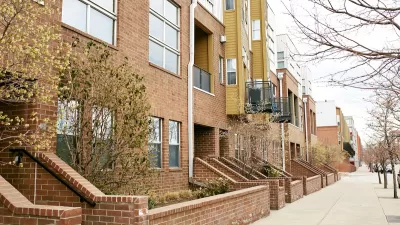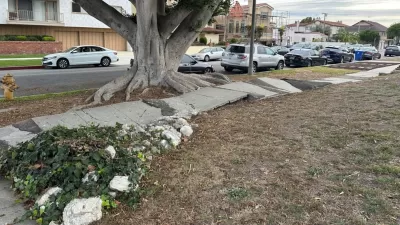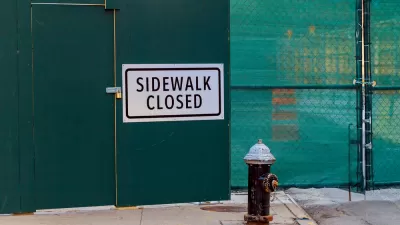The Colorado capital is the largest U.S. city to commit to maintaining its entire sidewalk network, funding repairs through a fee on property owners.

The city of Denver is taking a new approach to funding sidewalk repairs, reports David Zipper in Bloomberg CityLab.
Sidewalks are the unsung but essential infrastructure of millions of mundane daily journeys. But they tend to be chronically neglected — especially in neighborhoods whose residents rely on them most.
As Zipper explains, “Last month, the Mile High City began to fully fund and maintain its entire sidewalk network, taking over from private citizens. Most property owners will pay a $150 fee for sidewalks per year; a small minority with more than 230 linear square feet facing the street will pay $3.50 per additional square foot.”
The city is one of the first, and the largest in the country, to take on sidewalk repairs (most cities leave it up to private property owners, resulting in a patchwork of conditions). “According to a recent study, 23 of the largest 30 US cities make property owners responsible for sidewalk construction and maintenance, even as public agencies themselves pave streets and highways.”
After years of advocacy from residents, the city enacted legislation that wraps sidewalk repair fees into Denverites’ biannual stormwater fees. “The $150-and-up fee is projected to bring in $40 million per year, which will finance around $850 million in debt. To give a sense of scale, $850 million is roughly double the annual budget of Denver’s Department of Transportation and Infrastructure.” The approach could be a useful model for other cities, particularly as future federal funding for sidewalks and safe streets projects appears uncertain.
FULL STORY: Who Should Pay to Fix the Sidewalk?

Alabama: Trump Terminates Settlements for Black Communities Harmed By Raw Sewage
Trump deemed the landmark civil rights agreement “illegal DEI and environmental justice policy.”

Planetizen Federal Action Tracker
A weekly monitor of how Trump’s orders and actions are impacting planners and planning in America.

The 120 Year Old Tiny Home Villages That Sheltered San Francisco’s Earthquake Refugees
More than a century ago, San Francisco mobilized to house thousands of residents displaced by the 1906 earthquake. Could their strategy offer a model for the present?

Ken Jennings Launches Transit Web Series
The Jeopardy champ wants you to ride public transit.

BLM To Rescind Public Lands Rule
The change will downgrade conservation, once again putting federal land at risk for mining and other extractive uses.

Indy Neighborhood Group Builds Temporary Multi-Use Path
Community members, aided in part by funding from the city, repurposed a vehicle lane to create a protected bike and pedestrian path for the summer season.
Urban Design for Planners 1: Software Tools
This six-course series explores essential urban design concepts using open source software and equips planners with the tools they need to participate fully in the urban design process.
Planning for Universal Design
Learn the tools for implementing Universal Design in planning regulations.
Clanton & Associates, Inc.
Jessamine County Fiscal Court
Institute for Housing and Urban Development Studies (IHS)
City of Grandview
Harvard GSD Executive Education
Toledo-Lucas County Plan Commissions
Salt Lake City
NYU Wagner Graduate School of Public Service





























